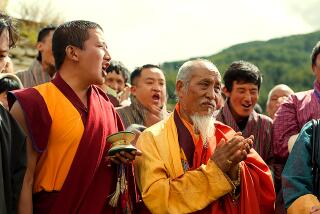‘Tale’ Tells of Life on Steppes and Beyond
- Share via
Xie Fei’s beautiful “A Mongolian Tale” is a deceptively simple tale of love and loss, redemption and forgiveness. As a story set in Mongolia and dealing with the inevitability of change, it will surely be compared with Nikita Mikhalkov’s somewhat similar and equally splendid 1992 “Close to Eden.” The difference between Mikhalkov’s Oscar-nominated film and this exquisite film, based on Zhang Cheng-Zhi’s popular 1982 novel “Black Steed,” is primarily one of perspective, in that it is told by an insider rather than an outsider.
When a city man becomes widowed, he turns over his small son to be raised by his own foster mother, who follows an ancient way of life as a nomadic shepherd. The boy, Bayinbulag, grows up in an idyllic existence with his beloved Grandma (majestic veteran actress Dalarsurong) and her daughter Somiya, who is roughly the same age as he is. In its first hour the film, set in magnificent grasslands and snowy winter camps, celebrates the life these three lead, close to nature and full of love for one another.
However, just as we’re thoroughly immersed in a long-ago world, Bayinbulag, stretched out in a field, watches a jet streaking across the sky overhead. Very shortly, his father will be summoning him back to the city for veterinary studies; somehow a planned eight-month sojourn stretches out to three years. Even so, the now-adult Bayinbulag (Tengger, a major pop singer-composer) forsakes college to return to the steppes to marry his true love Somiya (Naranhuar, the star of Xie’s celebrated “Girl From Hunan”).
An incident, however, has occurred during Bayinbulag’s absence that will so wound his immature male pride that he turns around and leaves, not to return again for another 12 years. This is the heart of the matter, for the film suggests with a subtle power that true morality derives from nature--that city life can inspire judgments at once abstract and cruel.
However, it takes Bayinbulag so long to grow up that the consequences of his angry departure are unalterable, both for him and for Somiya. Yet “A Mongolian Tale” holds out for the possibility that in spirit individuals can transcend circumstances--that the values of the past, therefore, have crucial meaning in the present.
There’s a poetic quality, combined with a novel’s depth of characterization, that makes “A Mongolian Tale” a memorable experience, superbly acted, gorgeously photographed and plaintively scored by Tengger himself.
* Unrated. Times guidelines: deals with complex adult relationships but is suitable for sophisticated older children.
(BEGIN TEXT OF INFOBOX / INFOGRAPHIC)
‘A Mongolian Tale’
Tengger: Bayinbulag
Naranhuar: Somiya
Dalarsurong: Grandma
A New Yorker Films release. Director Xie Fei. Producers Ma Fung-kwok, Wellington Fung. Executive producer Jin Ji-wu, Du Yong-ling. Screenplay by Zhang Cheng-Zhi, adapted from his novel “Black Steed.” Cinematographer Fu Jing-sheng. Editor Xie Fei, Zhao Xiu-qin.s Costumes Wurtanasun. Music Tengger. Set designer Lopsunbazer. In Mongolian, with English subtitles. Running time: 1 hour, 43 minutes.
* Exclusively at the Nuart for one week, 11272 Santa Monica Blvd., (310) 478-6379.
More to Read
Only good movies
Get the Indie Focus newsletter, Mark Olsen's weekly guide to the world of cinema.
You may occasionally receive promotional content from the Los Angeles Times.










